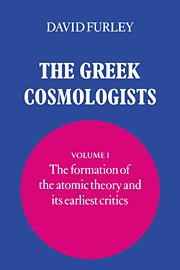Book contents
- Frontmatter
- Contents
- Preface
- 1 Two pictures of the world
- 2 The judgement of Socrates
- 3 The beginning in Miletus
- 4 Two philosophical critics: Heraclitus and Parmenides
- 5 Pythagoras, Parmenides, and later cosmology
- 6 Anaxagoras
- 7 Empedocles and the invention of elements
- 8 Later Eleatic critics
- 9 Leucippus and Democritus
- 10 The cosmos of the Atomists
- 11 The anthropology of the Atomists
- 12 Plato's criticisms of the materialists
- 13 Aristotle's criticisms of the materialists
- Bibliography
- Index of passages
- General index
8 - Later Eleatic critics
Published online by Cambridge University Press: 27 January 2010
- Frontmatter
- Contents
- Preface
- 1 Two pictures of the world
- 2 The judgement of Socrates
- 3 The beginning in Miletus
- 4 Two philosophical critics: Heraclitus and Parmenides
- 5 Pythagoras, Parmenides, and later cosmology
- 6 Anaxagoras
- 7 Empedocles and the invention of elements
- 8 Later Eleatic critics
- 9 Leucippus and Democritus
- 10 The cosmos of the Atomists
- 11 The anthropology of the Atomists
- 12 Plato's criticisms of the materialists
- 13 Aristotle's criticisms of the materialists
- Bibliography
- Index of passages
- General index
Summary
The crucial importance of Parmenides of Elea in the history of cosmology has been explained. We must now turn to his followers, who reinforced his arguments with contributions of their own. Some of these played an extraordinary and fascinating part in the development of Atomism, and their authors have an assured place in history. It happens that these connections have been fairly thoroughly explored in recent literature, especially in the English language, and this chapter will accordingly be relatively brief.
We hear of two followers of Parmenides, each about one generation younger than he was. Zeno came from Parmenides' home town of Elea, Melissus from the Aegean island of Samos, the birthplace of Pythagoras. Their work can be dated about the middle of the fifth century. There is no doubt about their allegiance. For Zeno, we have Plato's authority: his dialogue called after Parmenides presents Parmenides, as a man of sixty-five, with Zeno as a companion then aged about forty, in conversation with Socrates, at the time still very young. The occasion itself is probably fictitious, but the relative ages are likely to be about right, and when Plato has Zeno say that his book was in support of Parmenides' argument, he may be believed. Against those who ridiculed Parmenides' thesis ‘One thing is,’ Zeno is made to say, he wrote to show that still more ridiculous things follow from the contrary thesis, ‘Many things are’ (Parmenides 128b–c).
- Type
- Chapter
- Information
- The Greek Cosmologists , pp. 105 - 114Publisher: Cambridge University PressPrint publication year: 1987



